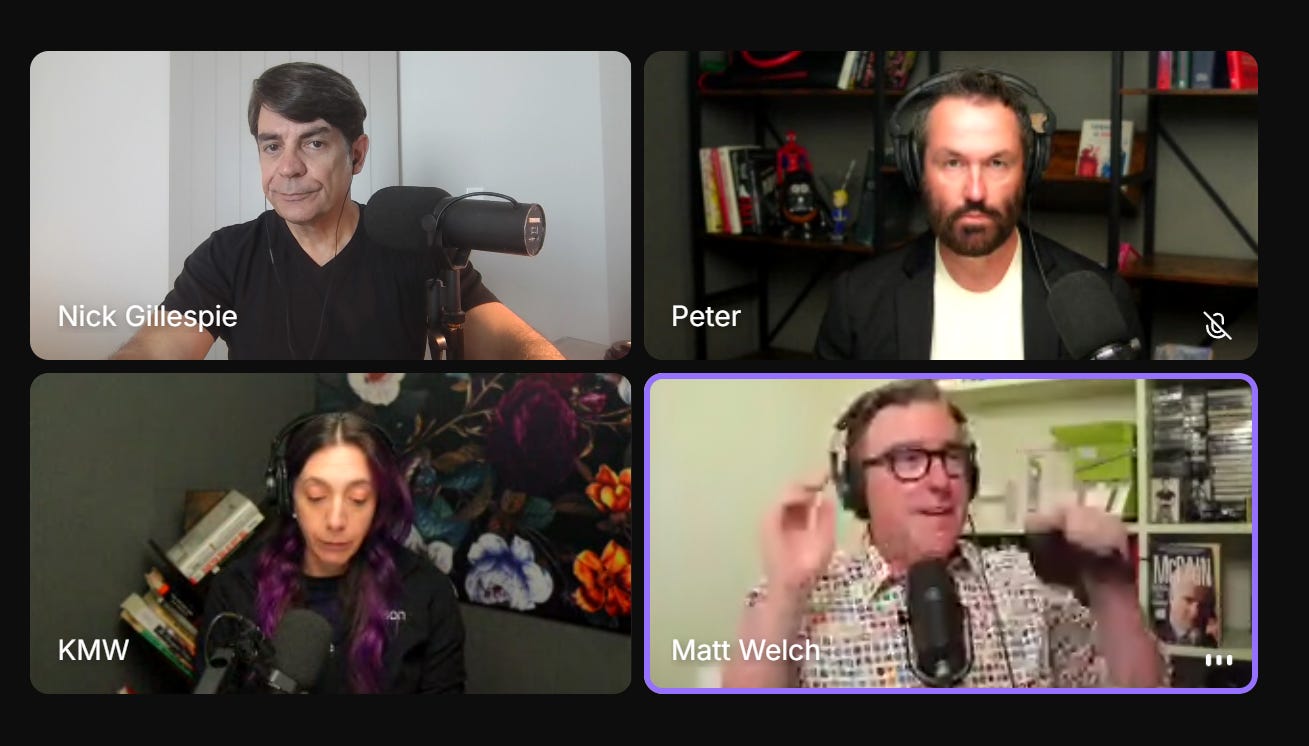Will a Shutdown Finally Shrink Government?
The short answer is no. So is the long one. We need a consenus—and a Congress—that actually wants to cut the size, scope, and spending of the federal government.
There’s a new Reason Roundtable up, featuring me,
, , and talking about the looming government shutdown, the Trump administration’s theory of an ultra-powerful executive branch, Comey vs. FBI (god, can’t they both lose), and the banal and vapid glorification of ‘revolutionary’ violence at the heart of Paul Thomas Anderson’s new movie One Battle After Another.Will the government shutdown at the end of today? Based on Trump’s tweet from yesterday, all signs point to yes:
This is sad stuff. Might be funny if it at least led to a smaller government, but shutdowns usually don’t have that effect. The small portion of spending that actually gets frozen always gets added back, plus interest, etc. Throughout Trump’s time in office (both the first time around and now), he has always expanded spending and debt. This term, he is aggressively expanding federal power through wide-scale tariffs (coming soon to court cases near you), immigration raids, and full-blown state capitalism. Something has really gone wrong when even diehard libertarians are calling for the stupid government not to shut down.
As I argue in the podcast, there’s only one way to cut spending. That’s by building a consensus that government should be smaller and then cramming it down Congress’ throats (they pass the budgets after all), including entitlement spending. A million years ago (read: early 2000s) when I started writing about budget issues, you could note that the federal budget was basically split between discretionary spending (such as defense and education), which was voted on each years, and entitlements (Social Security, Medicare), which was on autopilot. These days, discretionary spending is about a quarter of all spending, with the rest being entitlements and interest payments on the national debt—none of which is affected by shutdowns.
I caught Paul Thomas Anderson’s One Battle After the Other over the weekend. He’s a great filmmaker but this movie, like its inspiration (Thomas Pynchon’s weak 1990 novel Vineland), just doesn’t interrogate the counterculture’s old romance with ‘revolutionary violence.’ Odd that this film came out during a spasm of political violence—and around the death of Assata Shakur, who was once know as JoAnne Chesimard, who was convicted of killing a New Jersey state trooper in 1977. Part of the Black Liberation Army, Shakur had her reasons, but they weren’t very good ones—and as my Reason colleague
notes in his obit of her in the link above, her devotion to the Castro regime in Cuba, where she lived in exile, didn’t help her case. I’d love to see a film or novel that grapples both with the attraction of revolutionary, even terroristic, violence and the horror and stupidity of it, but neither Anderson nor Pynchon (nor Don DeLillo, alas) seems up to the task.It’s a good podcast episode. Here’s the Reason writeup, followed by embeds to YouTube, Spotify, Apple, and SoundCloud versions.
This week, editors Peter Suderman, Katherine Mangu-Ward, Nick Gillespie, and Matt Welch discuss whether the impending government shutdown will actually rein in the federal bureaucracy. They consider whether there is anything to gain from a shutdown, how past shutdowns have played out, and whether the risk of growing executive power outweighs the risk of uncontrolled spending.
They also examine the indictment of former FBI Director James Comey and whether it’s about retribution or substance, President Donald Trump’s deployment of federal troops to Portland, and New York Mayor Eric Adams’ decision to exit the mayoral race. A listener question prompts a conversation about cyclical theories of history and whether frameworks like The Fourth Turning help explain our current moment or merely provide the illusion of clarity.
0:00—Shutdown showdown and shrinking the government
9:24—Russell Vought and the growth of executive power
25:34—James Comey faces an indictment
31:38—Eric Adams drops out of NYC mayoral race
40:42—Listener question on cyclical frameworks in history
48:06—Trump sends federal police to Portland
56:30—Weekly cultural recommendations
If you like what I’m posting here, please follow, subscribe, share, and leave a comment.

